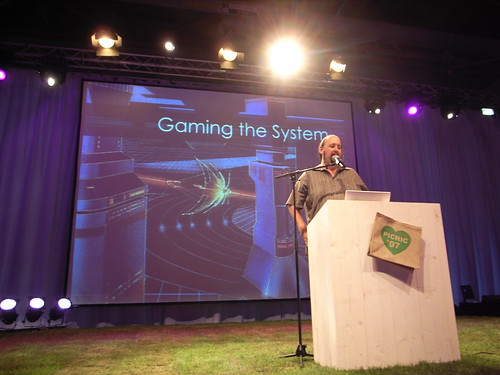Last bit from Pic Nic: my notes form Ben Cerveny's talk: "Gaming the System"

Ben started his talk by claiming his main hypothesis: game can be thought as a way into thinking how to approach not only entertainment but also computer-human interactions as a whole. Acknowledging the breakdown of the "operating system": to him, "architecture" and underlying principles as a mean to organize context in culture has failed. What is interesting to him is what happen in the margin, not in the over-organized areas: this is where 'play' happens.
So what would be a space of play? According to Ben it's a space of fragments and flows in which objects are interconnected, a dynamic environment that is evolving constantly ("we're leaving behind linear constructs"). Another characteristic is the profusion of dimensions ("an aura of multidimensionality that surrounds everything"). Game design can be then seen as a description and tuning of the variables: the building of models to handle the domain of play ("depeche models"). Data visualization is a possible way to model phenomena ("maps for these territories").
And games are meant to explore models. In the process of playing a game, people are not afraid to learn (as opposed to use applications). The mindset of play invokes the optimal experience: play invokes flow and brings you into the flow. Game design defines a vocabulary of moves that are internalized by players and this type of "literacy" is going to allow people to utilize complex applications. Video-game players have internalized how simulation works, as a new scientific approach. They can reclaim this knowledge to other fields: players are able to find patterns for example.
Games are instances of play, a way to understand the boundaries and to learn, they can be seen as a vehicle for understanding. Ben concluded that much of our future lies in literacy about dynamic systems such as the one designed in games: "play is about fluidity, work is about crystallization", "play as the negative space of work that allows work to continue".
To a person in the audience who asked whether this meant the end of traditional knowledge, Ben answered that "it doesn't mean that books are over, it's just that we build a more complex construct that takes into account games in the production of culture".
Why do I blog this? I like the "meta" aspect of Ben's talk. In this case, I found very interesting how he wrapped up all these aspects that makes a lot of sense considering past background in the field. This is the sort of elements I discussed for years with some game designers.
At a less meta level, the implication I see in this is not to think of games are a way to convey and directly put content in players' brain but rather that the cognitive processes mobilized when playing games can create relevant routines that may possibly be transfered to other activities.